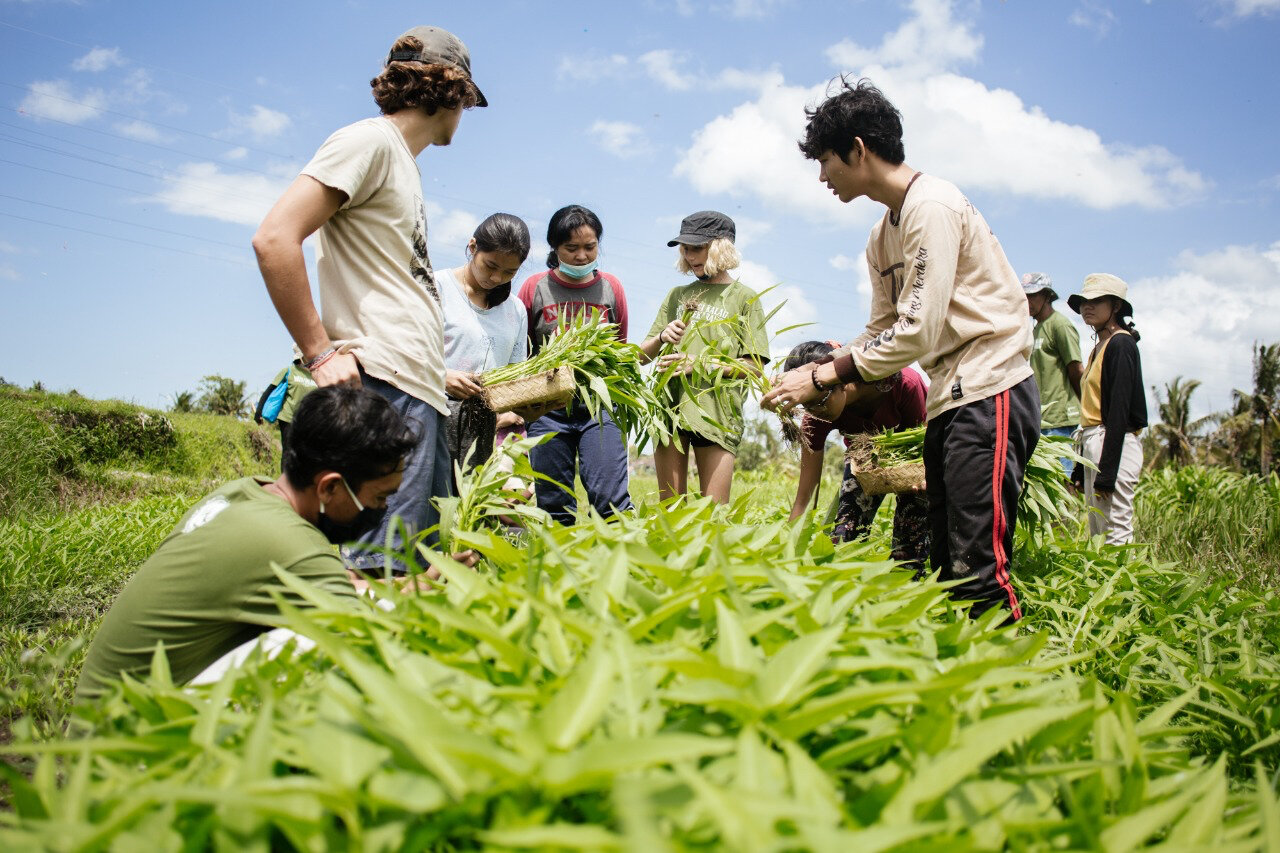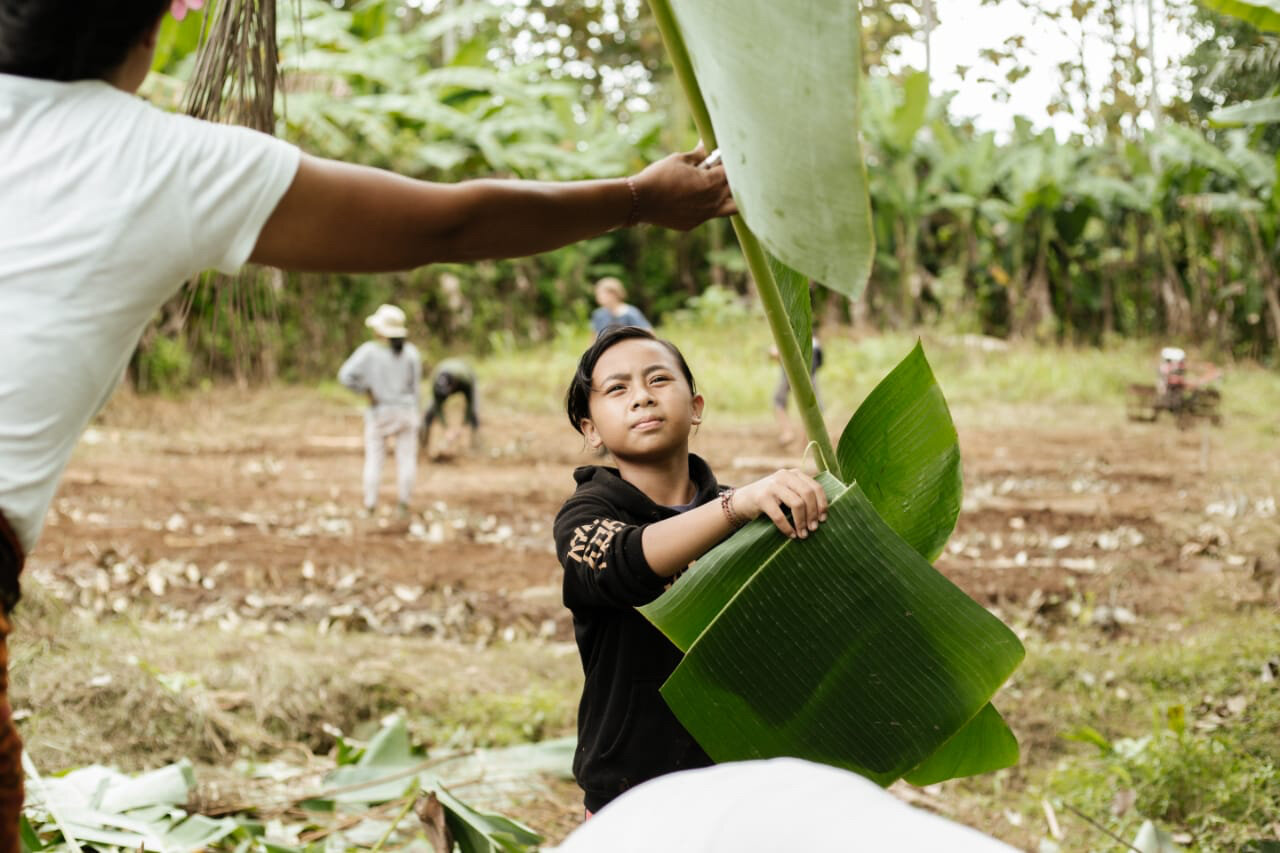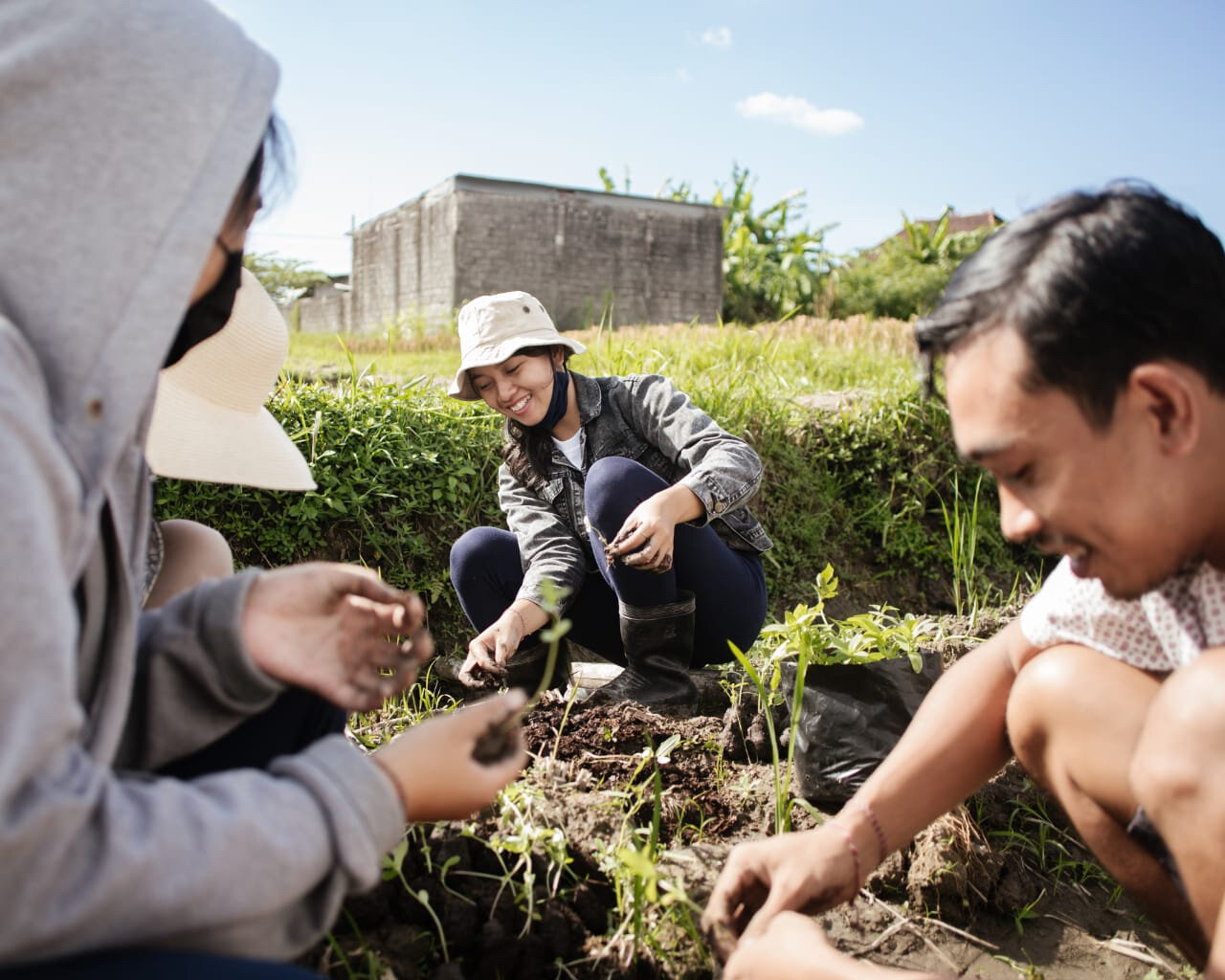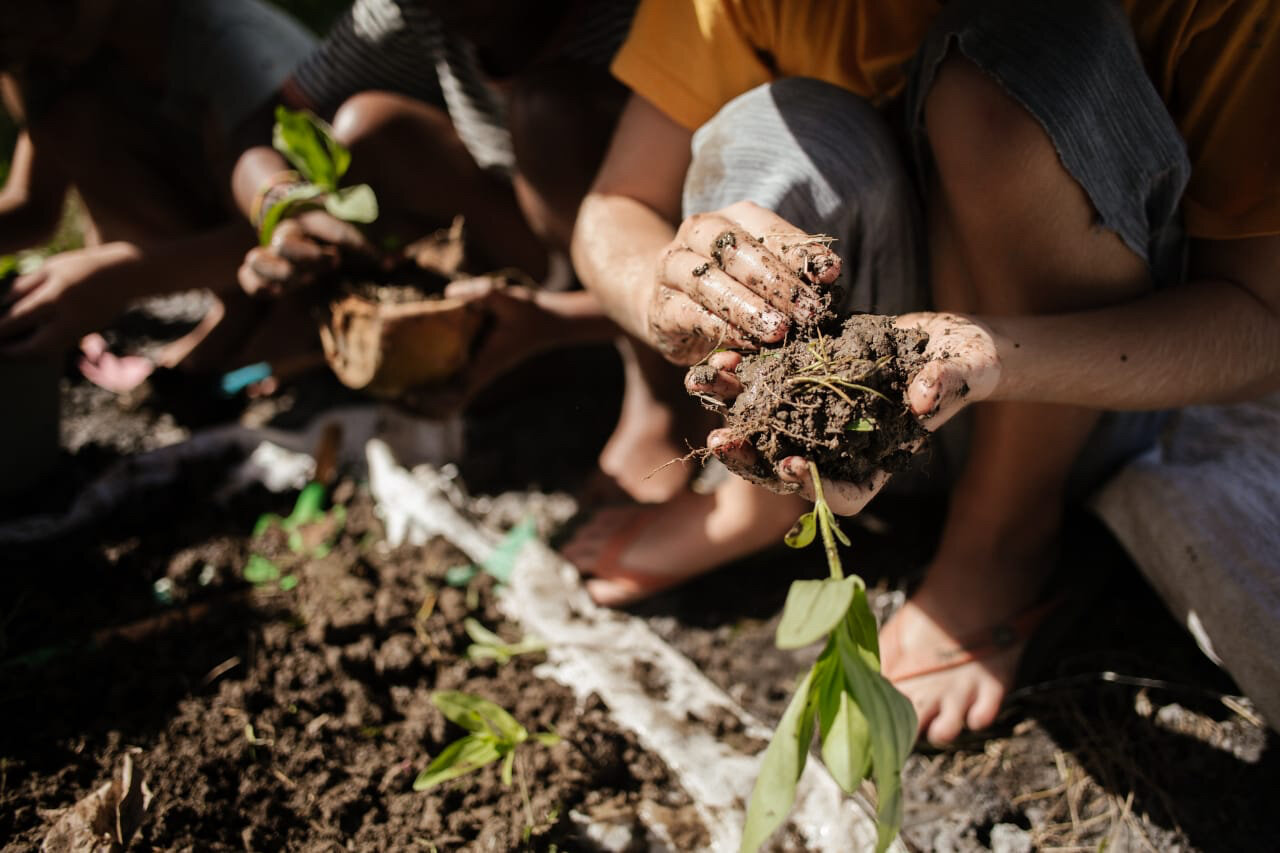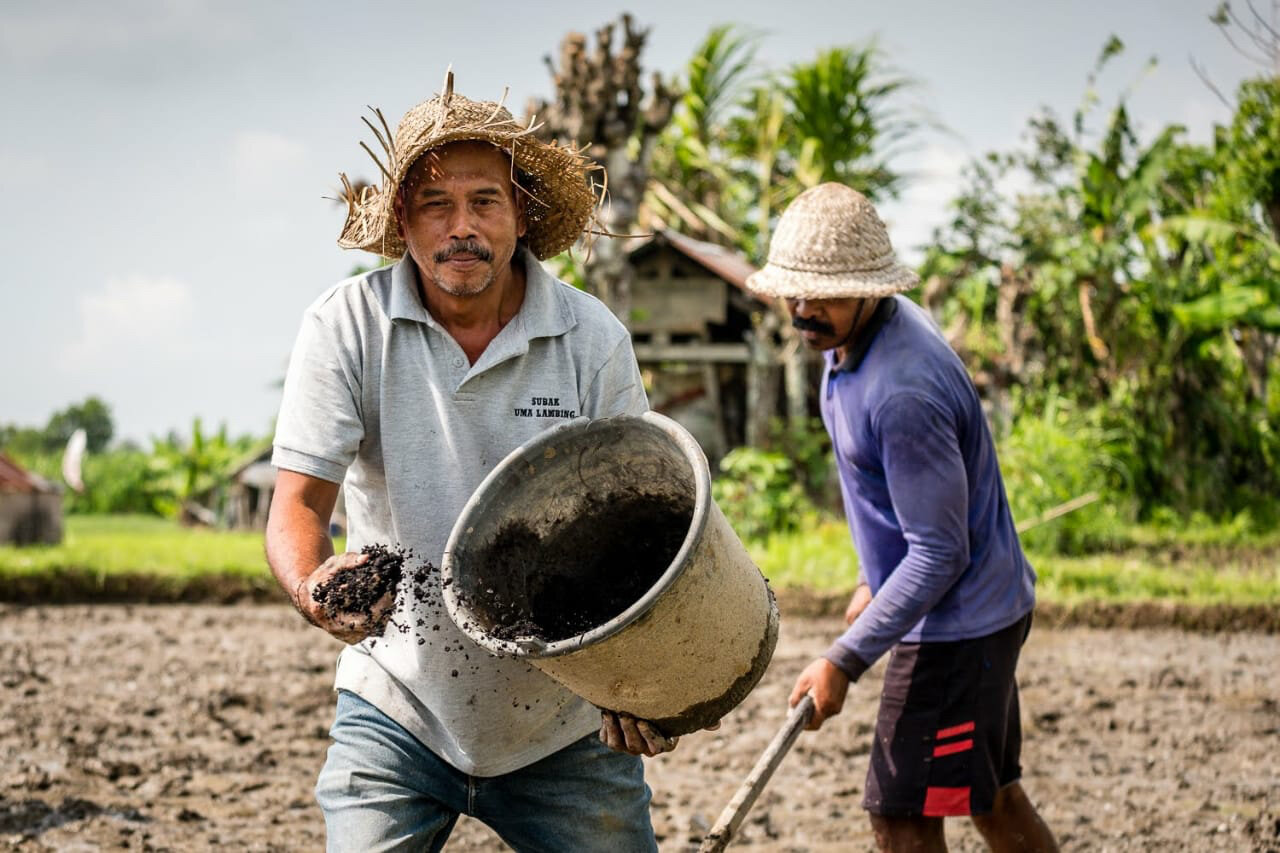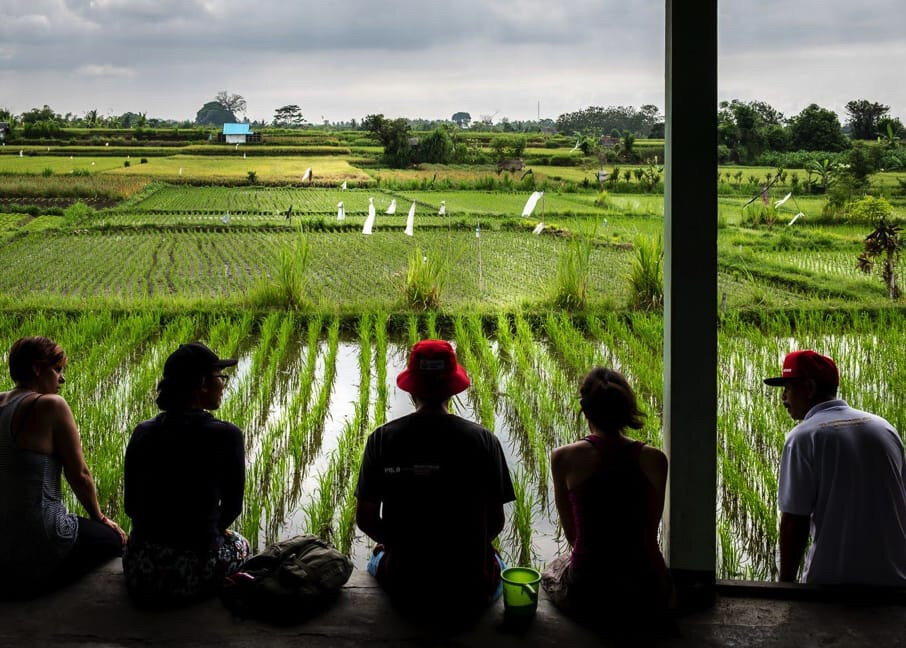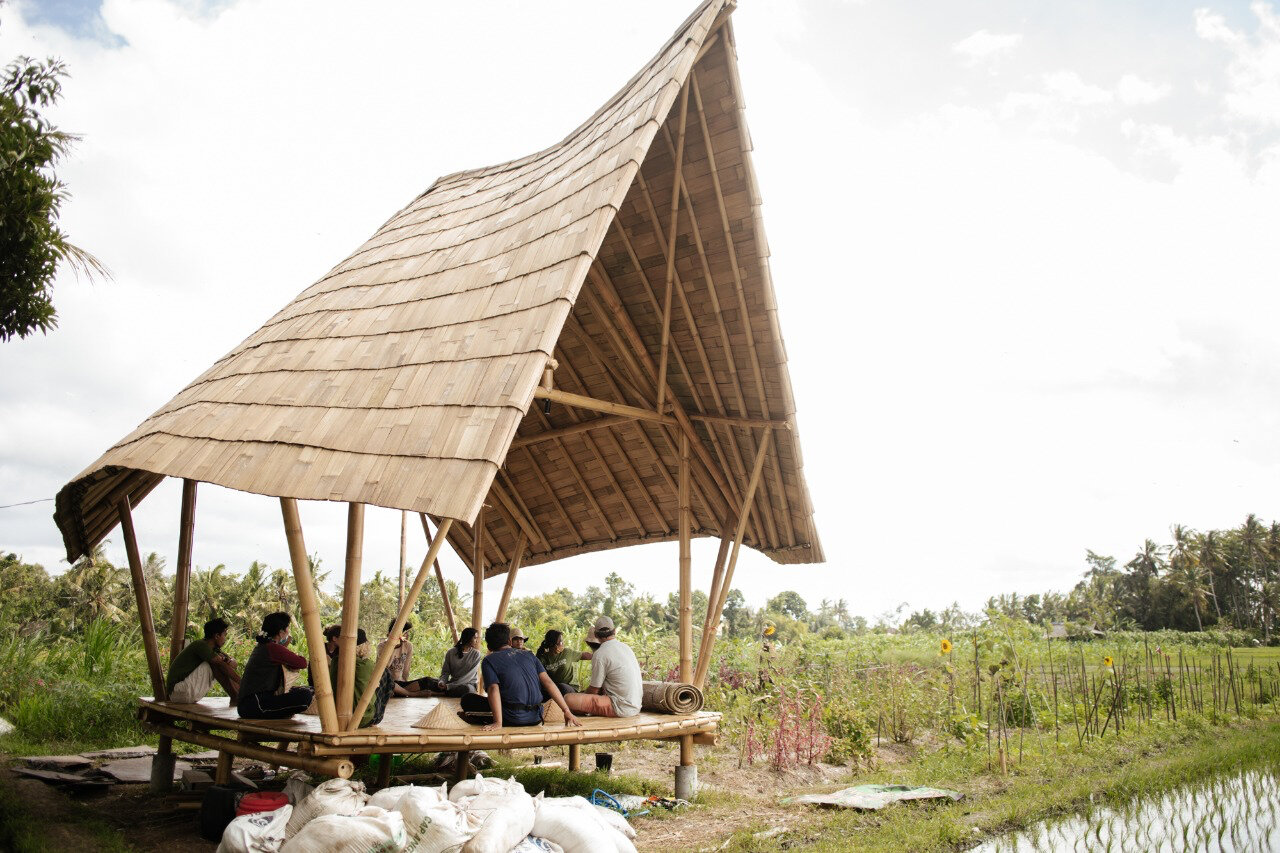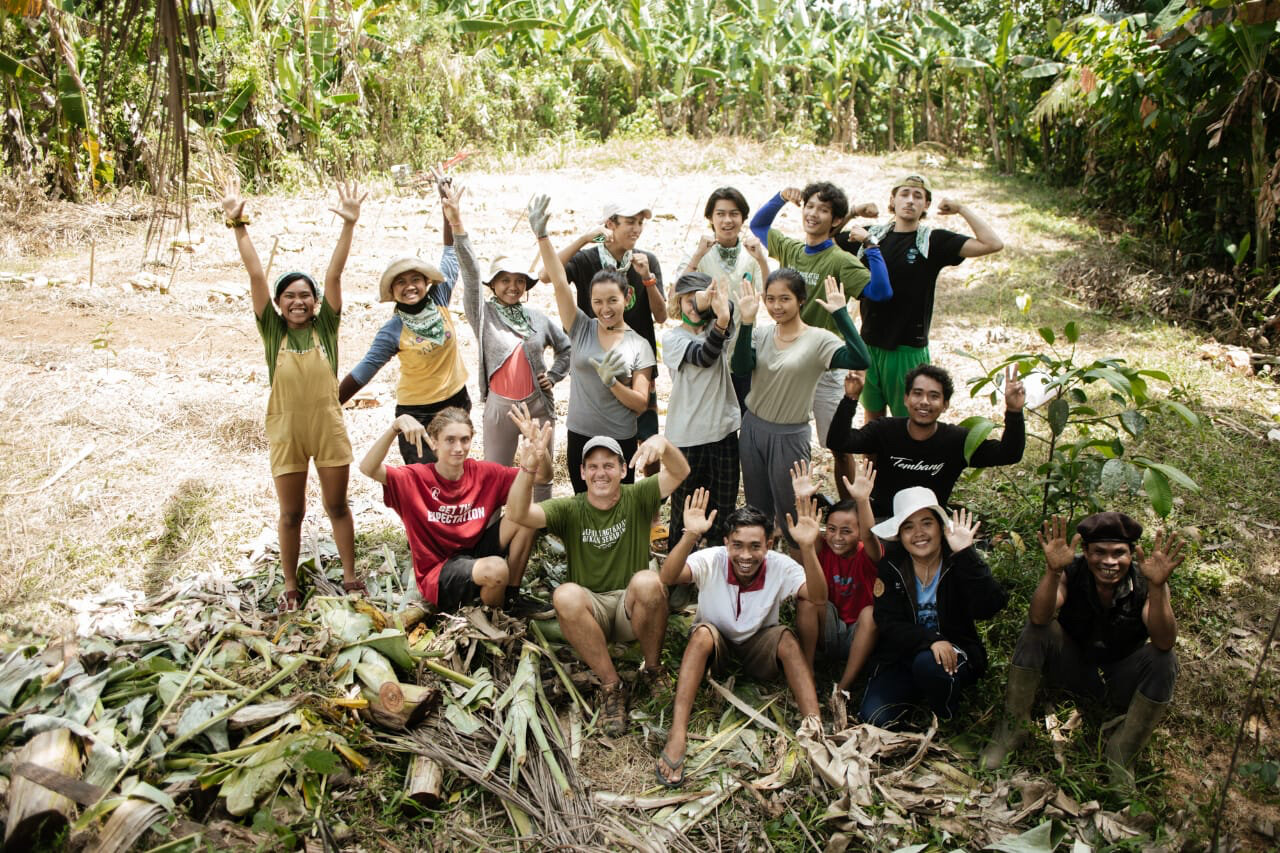GLOBAL SENSE in Bali
FIELDS OF FUTURE WISDOM
game changer Astungkara Way | interview with Tim Fijal (Founder) | destination Bali, Indonesia | photography courtesy astungkara way
LUSH, GREEN, TERRACED RICE FIELDS MAKE UP A MILLION POSTCARD VISIONS of BALI. but on ground level, it's more significant to note that a farmer's hand has planted every single seedling that makes up all of Those breath-taking photographic scenes.
Rice is considered the 'seed of life' in Bali. Rice farming is a 12th century-old practice and the 'Subak' irrigation system (UNESCO world heritage listed), is Bali's ingenious irrigation system established very early in their civilization to achieve balance and sustainability.
Astungkara Way is on a great mission to keep Bali's ancient farming tradition sown into modern life, for generations to come.
CLIMATE CHANGE AND SUSTAINABILITY: TWO TOPICS ECHOING LOUD AROUND THE WOLRD MORE THAN EVER, AND AT THE TOP OF THE ASTUNGKARA WAY MISSION. PLEASE SHARE WITH US, A LITTLE MORE ABOUT YOUR VISION, TIM…
The primary goals at Astungkara Way are to contribute to climate change mitigation, ecosystem regeneration and community interdependence and resilience, by making farming a compelling alternative to tourism for young generations. We are building a new, regenerative model that can be proven in Bali, then applied in other locations globally where farming needs to regain its importance and take rightful place as a powerful climate change mitigation and localisation tool. Our model is an inclusive one that is meant to empower any individual or organisation anywhere to get involved in regenerative action.
FROM PLANTING THE SEED TO NOW, HOW HAS THIS WONDERFUL BALINESE INITIATIVE GROWN FROM AN ECO-SMART IDEA INTO A BLOSSOMING FIELD OF OPPORTUNITIES?
I spent 9 years working at Green School Bali with a focus on finding ways for local and international communities to come together in a symbiotic way to tackle local environmental challenges. This work led me to connecting with a rice farming cooperative in the vicinity of Green School where I was touched by the determination of local farmers despite challenging circumstances. From farming rice with them and listening to their stories, we learned of their concern for the degradation of soil quality as a result of the ‘Green Revolution’… over the past 50 years, chemical inputs have been poured onto their ancestral land. They are realising an urgent need to transition back to natural farming methods, that were the norm before ‘conventional chemical agriculture’ was imposed upon them.
But, this shift comes with risks to financial and food security, globally, and especially in Bali. The average age of farmers is getting progressively older and the next generation is not stepping up to steward their ancestral land, to become the providers of food for the future. Farming in Bali is also inextricably linked to their cultural heritage, community structure, daily life and religion. It would be a tragic loss if the farming tradition is not taken up by Balinese youth.
From these grave realisations, a bright opportunity emerged. To engage local youth in the fields by making farming sexy again. What started off as a simple rice-cycle course for international parents of the Green School, has transitioned into a rapidly expanding project with the potential to positively impact local youth and ecosystems, island wide.
As a destination population that has become highly dependent on mass tourism for survival, Astungkara Way responds to provide an essential alternative solution that not only preserves traditional farming practice and generates employment opportunities that are meaningful, purposeful and essential in the local food chain, but this regenerative farming program will restore a localised revenue-making industry to rely upon for generations to come.
SUSTAINABLE FARMING IS ESSENTIAL WORLDWIDE.WHY DO YOU THINK THERE HAS BEEN A SHORTAGE OF INTEREST TO BECOME A FARMER IN BALI? IS THIS A COMMON CRISIS HAPPENING ALL OVER THE WORLD?
Yes! The ‘green’ revolution promised radically increased yields with lighter labour and wealth for farmers and their communities. Here in Bali, farmers were coerced to transition from 2 to 3 annual rice cycles, disregarding ancestral knowledge and connection to nature that had been nurtured over more than 12 centuries. Sadly, the result of this green revolution has been badly damaged ecosystems, illness and disease, and a loss of connection with ancestral knowledge. The same has happened the world over with industrial farming methods becoming the norm, and farmers being incentivised to ‘go big or ‘go home’. Indeed, a regenerative revolution to bring back soil quality and biodiversity is urgently required both as a means of mitigating climate change and to ensure our species (and others) have access to the nutritious food they need to survive.
So while there has been a shortage of interest in farming on the part of Balinese youth for the past two generations, the time is now to reinvigorate enthusiasm and engagement in agricultural activity. It’s interesting that Covid-19 has been a catalyst for youth to come back to the fields due to high levels of unemployment caused by the plummeting tourism sector.
But, with every challenge comes opportunity and the good news is, there is still a large number of small landholders actively farming their own land on this island. So it’s a time when the grandchildren of local farmers are spending educational time in the fields with their elders. They are receiving precious generational knowledge and techniques to preserve cultural heritage and one of Bali’s most sustainable family traditions.
The scale of the crisis in the western world is even greater given the radical drop in the number of farmers that occurred in the post-war era. It was at that time that chemical companies were nudging out small scale farming operations and consolidating their markets by promoting the monoculture approach that undermined biodiversity and soil quality that we all rely on to survive. The movement towards regenerative agriculture in the West will need to see a large number of smaller scale agriculturalists take to the fields sooner than later. If YouTube is any indicator, it would seem that this revolution is well underway with channels promoting permaculture and natural farming methods spiking with millions of followers.
ARE CHILDREN BEING EDUCATED ABOUT TRADITIONAL AGRICULTURE IN SCHOOLS AT THE MOMENT? HOW DOES ASTUNGKARA WAY HOPE TO INSPIRE THE YOUNGER GENERATION TO UNDERSTAND AND LOVE TRADITIONAL FARMING AS THE KEY TO A HEALTHY AND SUSTAINABLE FUTURE?
Bali’s schools are no different to the vast majority of educational systems on the planet at present. Though much of the most fundamental skills and knowledge that humans require to survive and thrive is not learned through traditional education. I find it very difficult to understand why skills as essential as growing one’s own food are rarely covered in schools. But humans are as much a part of nature as animals and plants. When we return to the field to connect with nature and the source of our food, it is like coming home, and we see this evidence in the glowing faces of both the children and adults who participate in our education sessions in the rice paddies, agri-forests or community gardens. Simply providing humans with a context to connect back to nature is already, we notice having a great impact and something schools worldwide can do to expand education programs.
At Astungkara Way young Balinese students are learning on their grandparents’ fields, experiencing for the first time, the farming of rice. This immersive way of learning is very rewarding and must have some influence to instil more relevance of the importance of nature in harmony with a food chain. They laugh and chat together as they weed across the fields. They make tea from the plants they have grown and boil the water over fire on a traditional stove. They help build bamboo shelters, learn how to cultivate healthy soil and display an innate connection to this ancestral knowledge that they rekindle to traditional farming easily.
Youth need mentorship to learn how to obtain good yields using regenerative farming methods. Moreover, they need viable ways to turn their yields into a meaningful income. Astungkara Way is building a mentorship program to train Balinese youth to become successful social, agri-entrepreneurs. This program will provide access to the tools and equipment required to process yields so they can monopolise on valuable secondary bi-products, and also connect participants to a market to sell produce.
Astungkara Way wants to address the greatest challenges that farmers have faced since the industrial food system emerged, which is largely having access to the value chain and a market for crops without reliance on a very expensive middle man. We want to see young farmers proud of their work and yields, sustaining their families and communities. It’s really about a localisation movement to create resilience within communities and ecosystems. One we would like to see emerging around the world. No farmers means no food and no future.
LUSH GREEN TERRACED RICE FIELDS MAKE UP A MILLION POSTCARD VISIONS FROM BALI. (THEY MAKE LOCAL FARM LIFE LOOK LIKE A BEAUTIFUL DREAM). ON GROUND-LEVEL FARMING MUST BE A TOUGH JOB. PLEASE TELL US A LITTLE ABOUT THE CULTURAL SYMBOLISM OF A RICE FARMER IN BALI?
Yes, those images of terraced paddies are all over Instagram and often the only evidence of a farmer in the photos is a silhouette of their conical hat in a field of green.
It’s so easy to overlook the fact that a human hand has to reach down into the soil and plant every single one of those millions of seedlings when taking in those awe-inspiring, expansive landscapes. It’s definitely hard work but also a spiritual practice for the Balinese, that defines communal life, ritual and even religion on the island.
Rice farming is a perfect manifestation of Tri Hita Karana, the foundational philosophy for Balinese Hinduism. It is sometimes referred to as the recipe for contentment: Tri (three), Hita (causes) Karana (well-being). It’s all about balance. Farmers partake in a spiritual practice in temples in the middle of their rice paddies and shrines to worship Dewi Sri, the goddess of rice and fertility. They acknowledge the unseen and the need to maintain balance between humans and the spirit world that is omnipresent in nature.
And through the subak, a 12-century old ingenious and elaborate irrigation system, the Balinese establish balance between humans. Through community and cooperation and a spirit of sharing rarely found in other agricultural contexts, Balinese established this system very early on in their civilisation as a way of achieving balance and sustainability in their communities. Important lessons can be learned from the Balinese for a more sustainable way that are far greater to understand than consumer-driven tourism pre-pandemic.
Of course, balance between humans and nature is also essential in order to obtain farm yields. The Balinese expertly maintained this balance through the subak and passed down this Indigenous knowledge for over a millennium. But tragically, the ‘green revolution’ upset this delicate balance, now in dire need of being restored.
Balinese farmers are the stewards of this priceless cultural heritage for their island. It’s our wish that their status would be elevated for the vital role they play in holding this island culture in balance, and to provide sustenance for the people who live here.
WHAT OTHER KEY CROPS ARE GROWN ON THE ISLAND THAT ASTUNGKARA WAY HAS INCLUDED IN THE PROGRAM AS WAY TO HELP WITH EDUCATION AND SUSTAINABILITY?
We recently stumbled upon a cash crop for a group of our young Balinese Sekolah Subak students… lemongrass! We planted about a hundred stems with a big school group before the pandemic. About a month ago, I looked out at these massive lemongrass clumps and realised we had over a ton of biomass that could be processed into valuable essential oils and hydrosols using distillation equipment. Nature’s abundance is truly awe-inspiring. The kids are now learning about the process of growing healthy lemongrass to extract essential oils in the most effective way. We are confident that a lucrative social enterprise is emerging for youth here. But actually, there are so many potential cash crops across this very soil-rich island for young people to learn about and grow. Coffee, vanilla, citrus, seaweed, heritage rice, mangoes, salt, spices, medicinal plants… we have identified over twenty possible cash crops for which we plan to establish partnership projects all across the island. And we see agroforestry having great potential to drive regeneration of biodiversity and healthy soil. We can’t simply ‘aim’ for sustainability anymore. There is so much learning and so many ways to involve youth into the process of sustainable regeneration!
IN TRUE SHIBUI STYLE, PLEASE TELL US WHO MAKE THE TRADITIONAL CONE-SHAPED, FARMER HATS (’COOLIES’), SO ICONIC TO SOUTH-EAST ASIA?
I buy my conical hats from Ibu Kadek, the owner of a little toko (store) at the entrance of the rice paddies. But now that you ask, I must find out about the artisans who weave these practical and iconic farmers hats. Stay tuned.
ON A DAILY BASIS, FARMERS ARE DEALING WITH UNPREDICTABLE CROP YIELDS INFLUENCED BY THE MOODY ELEMENTS OF NATURE, HARD-YAKKA, MANUAL LABOUR AND OFTEN INTENSE, LONG HOURS UNDER THE SUN OR RAIN. WHAT DO YOU THINK TRADITIONAL FARMERS LOVE MOST ABOUT ‘SLOW WORLD’ FARMING AND ALL THE RESPONSIBILITIES THAT COME WITH BEING A KEY PROVIDER TO WORLD FOOD CHAINS?
Ah, perhaps this is the problem. That local farmers and local resources are being exploited to provide ‘world food chains’. The world needs more small land holders engaging in farming. The more this happens, the more you see biodiversity in local farms and healthy communities that consume their yields closer to home. This way we can mitigate climate change and start to see a reversal in the trend of diseases and illnesses resulting from the chemical food chain that we’ve become entangled in as a species.
Traditional farmers in Bali are rediscovering the true wealth of their island by coming back to natural modes to manage their fields. Tumpang sari (known as ‘biodiverse polycropping’ or ‘intercropping’ in regenerative farming circles), is a traditional concept that we hope to help re-establish on the island. Some of the old farmers look at the chaotic rows of our community gardens, packed with all manner of plants living in symbiosis. They smile and exclaim, “Tumpang sari!”
This is not the way to feed the masses but we do believe that by allocating a portion of their fields to sustenance farming using biodiverse intercropping methods, that more and more locals will come to appreciate ‘slow world’ ancestor heritage. Not only will this inspire healthier lifestyles, but hopefully more human contentedness. As a species, we are so desperately in need of this now.
HOW DO YOU THINK THE YOUNGER GENERATION REGARD FARM CULTURE ON BALI?
The younger generation have come to think of farming as dirty, uncomfortable, low-status work. Ironically, this impression of farming has been reinforced by their parents who would prefer to see their children in the air-conditioned comfort of a foreign-owned hotel earning a predictable paycheque than under the hot sun succumbing to the capricious will of nature. But we are confident that farmers can earn a better living at farming than they would simply by servicing the tourism industry if they are given adequate mentorship and tools to produce valuable goods and also provided access to local and regional markets. So many young people are returning to the fields to farm out of necessity now due to the economic crisis brought on by the pandemic. The time is now to engage with these young people and support them to find viable ways to become successful agri-entrepreneurs.
astungkaraway.com
If you fancy a SLOW TRAVEL pilgrimage experience in Bali, Click here to learn about the Astungkara Trail.
To read this interview in magazine format, flick to page 52, SHIBUI Issue 9 below…


